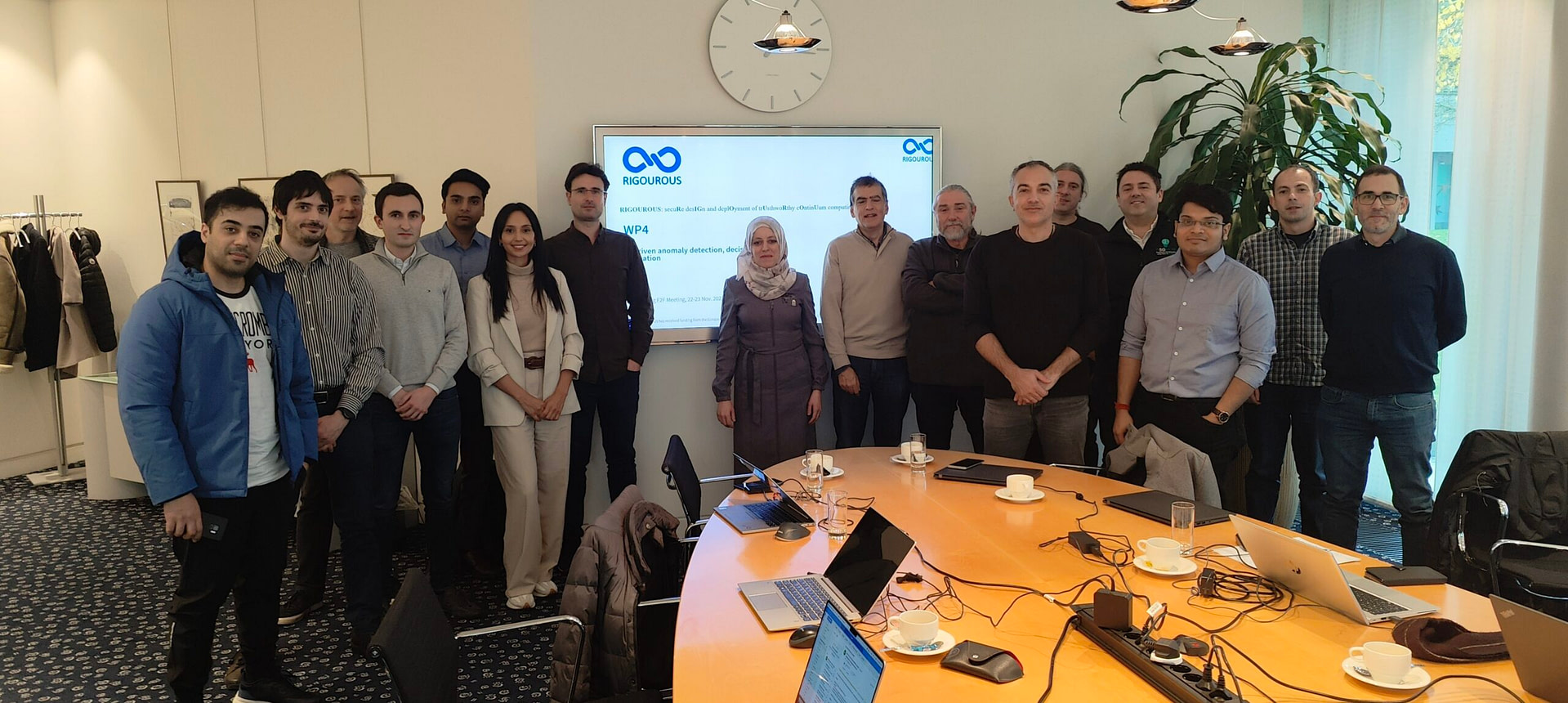December 2023

Project Highlights
Since the last newsletter, the project consortia evolved towards the RIGOUROUS vision at a fast pace, with several contributions to research, and milestones met.
Design plan of the multi-domain automated security orchestration, trust-management, and deployment
This milestone consisted in the initial outcomes coming from all the tasks in WP3, including the definition of the first version of the research, design, implementation, and modular testing of the enablers and components aimed to achieve AI-driven multi-domain automated security orchestration, end-to-end slicing, human-centric DevSecOps and zero trust-management for 6G system. It encompassed the activities focused on achieving the project objectives on holistic framework, human-centric DevSecOps, and AI-driven security orchestration.
In particular, we described the initial design and prototyping of the following solutions:
- Human-centric security and privacy modelling and quantification for DevSec operations.
- DevSec user-friendly tools.
- Onboarding specifications for network resources and devices:
- Adaptive deployment mechanisms by relying on on-the-fly resources provisioning and orchestration.
- Zero-trust security management.
- Enablers to accomplish End-to-End multidomain multitenant 6G slicing.
- Multi-domain security orchestration by applying corrective actions and counter measurements to detected security and privacy breaches to reduce risk.
Design Plan of the AI-driven Anomaly Detection, Decision and Mitigation
We also advanced to produce the first analysis and design of RIGOUROUS’s assets aiming at enabling AI-driven anomaly detection, decision, and mitigation in RIGOUROUS framework. The design of those assets is driven by the necessity of empowering timely detection and mitigation of anomalies to deal with the stringent reliability and availability needs of 5G and beyond (B5G)/6G networks and services. To this end, emerging Artificial Intelligence (AI) approaches, including Deep Learning (DL), Federated Learning (FL) and Transfer Learning, are adopted to deliver fully automated anomaly detection, decision-making and mitigation services.
The assets are grouped into six categories according to their functions and the services they provide in the context of anomaly detection, decision, and mitigation in B5G/6G environments. The following six categories are defined:
- The assets that enable collaborative anomaly detection while fostering privacy preservation.
- The assets that provide cognitive security decision-making, orchestration and management services.
- The assets that leverage AI and/or rule-based methods to provide security response and mitigation capabilities.
- The assets offering cutting-edge network flow and topology monitoring services that can be deployed alongside the data plane for effective detection of cyberattacks within a 5G network infrastructure as well as enabling subsequent actions to mitigate threats.
- The assets that strengthen AI robustness and improve privacy preservation; two key requisites to foster trust in AI.
- The assets that facilitate security testing by providing services that enable the simulation of physical spaces by replicating digital twins and creating cyber-range environments.
Each of these categories was carefully analyzed, with an emphasis on the innovations it introduces in comparison to the current state-of-the-art, followed by a detailed description of the asset, elaborating on its functional workflow and the key enabling technologies adopted to implement the asset’s services.
What happened recently
- Project team held a technical meeting in Luxemburg, hosted by RHEA, to discuss the project’s progress and upcoming milestones.
- Deliverables D2.1, D3.1 and D4.1 were produced to the project coordinator
- João Paulo Barraca highlighted the project at an outreach event Cybersecurity: A challenge for SME
- Mojdeh Karbalaee Motalleb, Chafika Benzaïd, Tarik Taleb, Vahid Shah-Mansour, presented Moving Target Defense based Secured Network Slicing System in the O-RAN Architecture at Globecom 2023
- Amir Javadpour, Forough Ja’fari†, Tarik Taleb, and Chafika Benza, presented Enhancing 5G Network Slicing: Slice Isolation via Actor-Critic Reinforcement Learning with Optimal Graph Features, at Globecom 2023
- Chafika Benzaïd, Tarik Taleb, Ashkan Sami, Othmane Hireche, presented A Deep Transfer Learning-powered EDoS Detection Mechanism for 5G and Beyond Network Slicing, at Globecom 2023
- Amir Javadpour, Farough Ja’fari, Tarik Taleb, HamidReza Ahmadi, and Chafika Benzaïd presented Cybersecurity Fusion: Leveraging Mafia Game Tactics and Reinforcement Learning for Botnet Detection, at Globecom 2023
- Samira Kamali Poorazad, Chafika Benzaïd, and Tarik Taleb presented, Blockchain and Deep Learning-Based IDS for Securing SDN-Enabled Industrial IoT Environments, at Globecom 2023
Follow us for further updates and interact





